January 15, 2016
Air Date: January 15, 2016
FULL SHOW
SEGMENTS
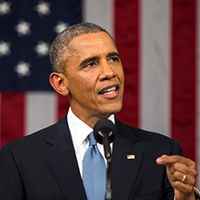
President Obama and the State of the Environment
/ Peter DykstraView the page for this story
President Obama recently delivered his final State of the Union address, outlining his vision for the last year of his Presidency and beyond. Host Steve Curwood chats with Peter Dykstra of Environmental Health News about the speech and what signals it sends about President Obama’s environmental agenda in the months ahead. (11:20)
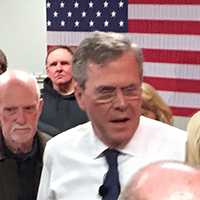
GOP Campaigns Diverge on Climate Questions
View the page for this story
In the mere weeks leading up to the nation’s first presidential primary election in New Hampshire, Republican candidates are campaigning heavily in a vital effort to sway voters. Host Steve Curwood tracked down Florida Governor Jeb Bush, Ohio Governor John Kasich and Florida Senator Marco Rubio to find out how the candidates would address climate change, if they occupied the White House. (10:30)
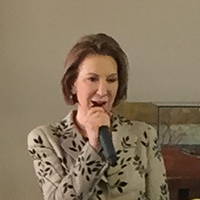
The Changing Climate in the GOP Race
View the page for this story
The partisan divide on the issue of global warming challenges Republican presidential candidates. Many GOP primary voters tend to be conservatives who are wary of climate action, but surveys show a majority of voters expected in the general election favor government action to protect the climate. Host Steve Curwood discusses the GOP field with The Atlantic's associate editor Clare Foran. (08:50)
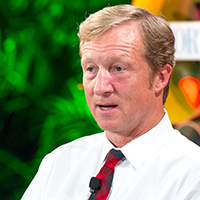
Financing the Renewable Revolution
View the page for this story
During the December 2015 climate summit in Paris, nearly 200 countries have effectively pledged to phase out fossil fuels by 2050 to help curb global warming. Host Steve Curwood and green financier Tom Steyer discuss the economics of this transition, including how California’s carbon pricing system is creating jobs and growth, and what could work in developing countries like India. (07:50)
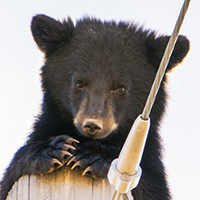
Saving a Bear Cub
/ Clay ScottView the page for this story
2015's heat and drought in Montana forced many black bear families to forage far from their natural habitat, and many young cubs were orphaned during the trek. Reporter Clay Scott follows game wardens as they rescue one such cub and transport him to safety. (04:45)
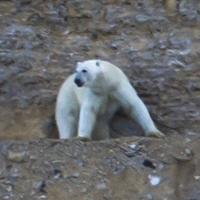
Polar Bear Summits Talus Mound
/ Mark Seth LenderView the page for this story
Up in the arctic north of Canada’s Akpatok Island, a large, male polar bear climbs crags in search of murre fledglings, but instead finds a plane full of sightseers rounding the bluff, surprising each other. Writer Mark Seth Lender reports from the Qikiqtaaluk Region of Nunavut, Canada. (03:25)
Show Credits and Funders
Show Transcript
HOST: Steve Curwood
GUESTS: Clare Foran, Tom Steyer,
REPORTERS: Peter Dykstra, Clay Scott, Mark Seth Lender
[THEME]
CURWOOD: From Public Radio International, this is Living on Earth.
[THEME]
CURWOOD: I'm Steve Curwood. In his final State of the Union speech, President Obama pointed the way to a greener energy future. But Republican hopefuls who want his job have a different spin.
RUBIO: Let's be number one in wind, and number one in solar, and number one in biofuels, and number one in renewables, number one in energy efficiency. Let's lead in all of these things. All I'm saying is, there's no way we're not gonna do oil and natural gas. God has blessed this nation with these resources.
CURWOOD: Where Republican candidates stand on energy and climate. Also, how the drought out in the Mountain West has been affecting some of the wildlife there.
MURPHY: We’ve been really, really busy with bears, all throughout the state this year. We’ve handled a lot of different urban wildlife bear complaints.
CURWOOD: The tale of a black bear cub rescue and more this week, on Living on Earth. Stick around.
[NEWSBREAK MUSIC: Boards of Canada “Zoetrope” from “In a Beautiful Place Out in the Country” (Warp Records 2000)]
ANNOUNCER: Support for Living on Earth comes from United Technologies – innovating to make the world a better, more sustainable, place to live.
President Obama and the State of the Environment
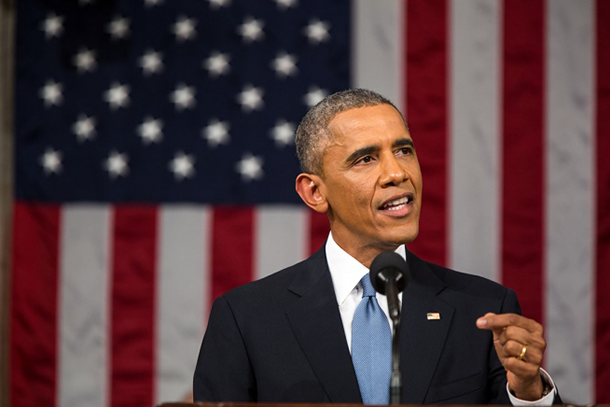
President Barack Obama delivers the State of the Union address in the House Chamber at the U.S. Capitol in Washington, D.C., Jan. 20, 2015. In previous SOTU addresses, he’s proposed cap and trade systems for carbon, but this has not come to pass. (Photo: Pete Souza, Official White House Photo)
CURWOOD: From the Jennifer and Ted Stanley studios at the University of Massachusetts Boston and PRI, this is Living on Earth. I’m Steve Curwood. In just about a year, America will inaugurate a new president, and on the eve of the first caucuses and primary elections, candidates are furiously battling for votes. Coming up, we’ll check what the Republican field has to say about the environment, especially climate change. But first, let’s take a look at some of the green legacy that outgoing President Barack Obama hopes to leave, and to do that I’m joined now by Peter Dykstra. Peter used to run the environment desk at CNN and now reports and edits for Environmental Health News and the DailyClimate.org. He usually talks with us about what’s going on beyond the headlines, but today he’s here to talk about Mr. Obama’s last State of the Union address that the President delivered on January 12. Hi there, Peter.
DYKSTRA: Well, hi, Steve. You know, over the years I’ve listened to a lot of State of the Union messages from lot of different Presidents, and any mention of energy and the environment is usually shoved to the back of the speech in the middle of a long list of platitudes about other things. But President Obama got into climate change fairly early, and fairly often.
OBAMA: Sixty years ago, when the Russians beat us into space, we didn’t deny Sputnik was up there. We didn’t argue about the science, or shrink our research and development budget. We built a space program almost overnight, and 12 years later, we were walking on the moon. [APPLAUSE] That spirit of discovery is in our DNA.
STEVE: OK, Peter, there was a bunch of big-picture stuff, what did you make of the specifics that were in this address?
DYKSTRA: There’s a couple of things, in addition to the sweeping call for clean energy growth, he made a reference to oil and gas leases on public lands.
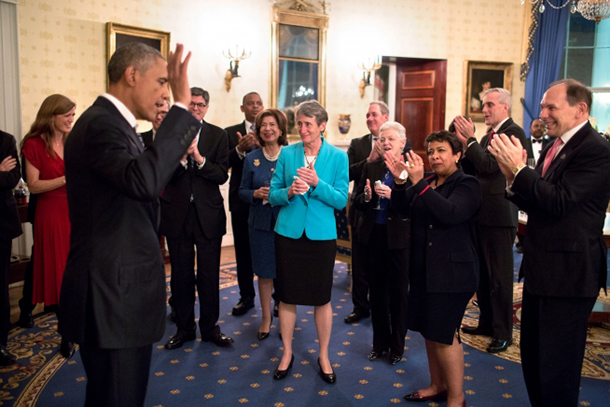
President Barack Obama acknowledges applause from Cabinet members during a reception in the Blue Room of the White House after his State of the Union address at the U.S. Capitol in Washington, D.C., Jan. 12, 2016. (Photo: Pete Souza, Official White House Photo)
OBAMA: Now we’ve got to accelerate the transition away from old dirtier energy sources. Rather than subsidize the past, we should invest in the future, especially in communities that rely on fossil fuels. We do them no favor when we don't show them where the trends are going. That’s why I’m going to push to change the way we manage our oil and coal resources, so that they better reflect the costs they impose on taxpayers and our planet. And that way, we put money back into those communities and put tens of thousands of Americans to work building a 21st century transportation system.
DYKSTRA: Now the President’s referring to oil and gas and coal leases on public lands, and that's a problem to a lot of people on two fronts. Number one, it causes a lot of environmental damage. But also it causes a lot of income loss — those oil and gas and coal leases on public lands are virtually given away.
CURWOOD: And environmental campaigners are also talking about keeping fossil fuels in the ground on federal lands. Now the President has used that language before — didn’t use it in this particular address, but they’re hoping that that was a nod to that. So, Peter, you were keeping some score of the applause lines, what scored most on energy and the environment?
DYKSTRA: Well, that Sputnik line about climate denial got one of the biggest cheers of the night. And his mention that America “cut carbon pollution more than any other nation on Earth” drew half a standing ovation.
CURWOOD: Well, that would be from his own party, I think.
DYKSTRA: Right.
CURWOOD: And he came back at the Republicans again on climate change denial.
OBAMA: Look, if anybody still wants to dispute the science around climate change, have at it. You’ll be pretty lonely, because you’ll be debating our military, most of America’s business leaders, the majority of the American people, almost the entire scientific community, and 200 nations around the world who agree it’s a problem and intend to solve it. [APPLAUSE]
But even if the planet wasn’t at stake, even if 2014 wasn’t the warmest year on record, until 2015 turned out even hotter, why would we want to pass up the chance for American businesses to produce and sell the energy of the future?
Seven years ago, we made the single biggest investment in clean energy in our history. Here are the results. In fields from Iowa to Texas, wind power is now cheaper than dirtier, conventional power. On rooftops from Arizona to New York, solar is saving Americans tens of millions of dollars a year on their energy bills, and employs more Americans than coal in jobs that pay better than average. We’re taking steps to give homeowners the freedom to generate and store their own energy, something by the way that environmentalists and Tea Partiers have teamed up to support. Meanwhile, we’ve cut our imports of foreign oil by nearly 60 percent, and cut carbon pollution more than any other country on Earth. [APPLAUSE] Gas under $2 bucks a gallon ain’t bad, either. [CHEERS]
DYKSTRA: You know, he sort of also took a bit of a victory lap with a gloat about $2 gasoline prices, which around my house, are actually a $1.72 right now.
CURWOOD: Hey, Peter, now you’re gloating, but the President shouldn’t really take full credit for those low prices, or for that matter get blamed when they’re high, right?
DYKSTRA: Yeah, the President of the United States doesn’t necessarily have control over global oil prices. But that line was a little payback for past Republican State of the Union responses where President Obama got blamed for higher prices. That happened in the 2010 response and again in 2014. But what Obama did is posed energy as a business challenge. And he did that in one other area as well. He used the space race analogy for another related issue, the fight to cure cancer, which he put Joe Biden in charge of.
OBAMA: Last year, Vice President Biden said that with a new moonshot, America can cure cancer. Last month, he worked with this Congress to give scientists at the National Institutes of Health the strongest resources they’ve had in over a decade.
[APPLAUSE, CHEERS]
So tonight, I’m announcing a new national effort to get it done. And because he’s gone to the mat for all of us, on so many issues over the past 40 years, I’m putting Joe in charge of Mission Control. [CHEERS]
CURWOOD: There’s one thing he didn’t mention in the connection with fighting against cancer — I mean, calling for a cure is one thing but he didn’t mention cancer risk from the environment. What’s the saying, an ounce of prevention is worth a pound of cure? Some 20 percent of cancers are linked to chemical exposure. Peter, what else didn’t the President mention in your view?
DYKSTRA: Well, there wasn’t a word about any non-climate or energy environmental issue; he could have mentioned, for example, that it’s the 100th anniversary of the National Parks system, something for everybody to be proud of. He barely touched on how many jobs are being created in clean energy — that could be something to gloat over! And not surprisingly, he didn’t rub the Republicans’ faces in the Keystone pipeline rejection, or rub his own face in previous State of the Union promises to introduce a cap-and-trade system for carbon.
CURWOOD: By the way, Peter, what did you make of the Republican response to the State of the Union, from South Carolina Governor Nicki Haley?
DYKSTRA: Governor Haley didn’t touch on any climate or environment or energy issues. Maybe that’s significant, because there’s been so much denial at the top of the Republican Party these days, and certainly among the presidential candidates; maybe it’s significant that she didn’t mention it. But I want to talk a little bit about a few other past State of the Union messages.
CURWOOD: Okay.
DYKSTRA: This month is the 10th Anniversary of George W. Bush looking the nation in the eye and announcing that we are addicted to oil. What’s happened since then? Imports dramatically down, SUV sales up this year with all that cheap gas, and bottom line is we’re still addicted. And here’s one of my favorite numbers: DOE says we drove just over one trillion passenger miles in the US in the year 1971; in recent years, that’s topped three trillion miles a year – that’s 342 million miles every hour, almost all of it on petroleum and a little bit of ethanol.
CURWOOD: Whoa. What else?
DYKSTRA: Obama focused a lot on the lack of bipartisanship on every issue, but two past presidents – both Republicans — focused on partisanship in the environment. In 1970, Richard Nixon said, "Restoring nature to its natural state is a cause beyond party and beyond factions." And then he went on a five-minute tear on protecting the environment that hasn’t been repeated since by any president, including Obama. And then there’s this one, from 1984 and President Ronald Reagan:
REAGAN: Preservation of our environment is not a liberal or conservative challenge, it’s common sense.
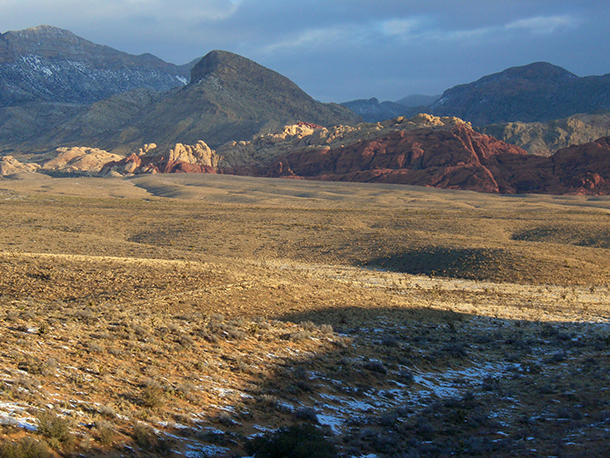
President Obama suggested rethinking how we manage fossil fuel reserves on federal lands. (Photo: Bureau of Land Management, CC BY 2.0)
CURWOOD: Good luck with that one in 2016, Peter.
DYKSTRA: Well, yeah, and here’s a couple of other numbers from history that kind of show how bad the partisanship has gotten on environment. The League of Conservation Voters for decades has put together a voter scorecard — judging who’s done a good job by their standards and who’s done a bad job on voting on the environment. Back in the
’80s, Democratic Congressmen and Senators generally averaged around 50 percent, Republicans around 30 percent. That’s a 20 percent gap, which is a big deal. But now it’s not a 20 percent gap: it’s more like an 80 percent gap, with Democrats scoring about 90 percent from the League of Conservation Voters, and Republicans scoring about 10 percent. And here’s one specific number that I think is really telling and maybe a little weird: in the 1980 League of Conservation Voters Congressional scorecard, there was a young Georgia Congressman named Newt Gingrich who scored 50 percent, and there was a young Tennessee Congressman named Al Gore who scored 35 percent.
CURWOOD: Huh? Why did Al Gore have such a low score?
DYKSTRA: It probably had a lot to do with the fact that there were energy issues involving the Tennessee Valley Authority in areas around his district. But Newt Gingrich had a higher voting score on the environment than Al Gore did in 1980.
CURWOOD: Thanks, Peter! Peter Dykstra is with Environmental Health News — that’s EHN.org — and the DailyClimate.org. And there’s more on this story at our website, LOE.org. Thanks, Peter, talk to you soon.
DYKSTRA: Thank you Steve, we’ll talk to you soon.
Since we recorded this segment, the Obama Administration and the Department of the Interior have halted new coal leases on public lands pending further review. Below are links to the US Department of Interior documents about the order and the government's information about current coal operations.
US DOI's "FACT SHEET: MODERNIZING THE FEDERAL COAL PROGRAM"
Additional information about coal operations and leasing on public lands
Related links:
- Watch President Obama's final State of the Union speech
- The Guardian: State of the Union: no let-up for Barack Obama's climate agenda
- League of Conservation Voters: Champs in Congress Support Climate Action
- Reagan’s State of the Union comment on environment
- Poll Finds Fewer Americans Than Ever Doubt Climate Change Is Happening
[MUSIC: Ray LaMontagne, Beg Borrow or Steal, God Willing and the Creek Don’t Rise, Stone Dwarf RCA, 2010]
CURWOOD: Just ahead...the crowded field of GOP candidates weighs in on global warming. Stay tuned to Living on Earth.
[CUTAWAY MUSIC: Davod Bowie, Abdulmajid, Heros BonusTrack 1, Rykodisc, 1991]
GOP Campaigns Diverge on Climate Questions

Former Florida Governor Jeb Bush says he thinks the Obama administration overstepped its bounds in accepting the Paris Agreement this past December. (Photo: Steve Curwood)
CURWOOD: [ROADSIDE SOUNDS]
It’s Living on Earth, and I’m Steve Curwood on the campaign trail in New Hampshire. If it’s early in a leap year then it is also the season of New Hampshire’s first in the nation presidential primary election, this time on February 9. All the Democratic contenders have called for government action to address the major national security threat of climate change, but there seems to be little appetite for that among the Republican candidates on the stump here in the Granite State.
[FOOTSTEPS CRUNCHING ON SNOW]
CURWOOD: I caught up with former Florida Governor Jeb Bush as he stopped to speak with reporters at the end of a modestly attended meeting with voters in Dover.
CURWOOD: Governor, the next president of the United States is going to have to deal with the Paris climate accord. What would you do to implement or push back on that?
BUSH: I don't have the details of what the President's committed to. He doesn't have the authority to do it. If he did, he would, once again, create a treaty which would be enforceable, so that's not on the list of things that I...
CURWOOD: How about climate change...
BUSH: Climate change in general is something that I think we all should be concerned about. The climate is changing. The good news is that our carbon footprint has actually been reduced by 10 percent in the last decade, is flat in the last 25 years even though we have an increasing population. We should be proud of that, and there are other things we can do as it relates to conservation and continued use of natural gas and things like that that would help in this regard. And ultimately, there will be renewables that will be more dominant than they are today. But to raise prices, to lose jobs, to deindustrialize the country, to create less economic activity, I don't think is the solution, and so, where I diverge from the President's approach is most of his approach is going to create higher costs on consumers and higher costs on businesses and I don't think we need to do that.
CURWOOD: Before you go, Governor, what do you see as the biggest economic engines for growth in America in the time you would serve as President?
BUSH: The advancement of technology and how that could increase productivity. It's hard to create jobs in that environment, but there's a great potential for income growth. The energy sector is explosive in its potential of higher growth and more capital investment.
CURWOOD: Say more about that on renewable energy if you would.
BUSH: Renewable as well, and we're seeing reductions in the cost per unit of solar production and wind. That's going to create big opportunities because much of that can be manufactured here.

Ohio Governor John Kasich says he is concerned about climate change but is reluctant to go on the record to say what he would do about it as president. (Photo: Steve Curwood)
[FOOTSTEPS IN SNOW]
CURWOOD: There are snowbanks to climb over as I make my way into a small but crowded town hall session in Exeter with Ohio Governor John Kasich, where he was taking questions from the floor.
KASICH: Yes, young lady.
WOMAN: Hi, John Kasich, I live in Exeter and my name is Elaine and, you know, I was just looking in the newspaper the other day and I read that 75 percent of Americans acknowledge that climate change is real, and I'm just wondering, with the same scientific consensus behind climate change as evolution and gravity, why do you think pretty much lots of Republicans deny this basic science? Why do you think that is?
KASICH: Well, I think that human beings do affect the climate. And I'm a big supporter of solar and wind and geothermal and efficiency, but I want all of the different sources I saw Seabrook today...I'm for nuclear too. I mean, I'm for all of this.
[APPLAUSE]
KASICH: I think sometimes...I really have an opinion why they do that, but I'm not going to tell you because it's not good. [LAUGHS] I am running in a Republican primary, but I'm for...I can't tell you how they think, but I can tell you what I think. I think there is something to climate change, but I think we have to take our time to have remedies, and the remedies are things like efficiency and solar and wind. And I think the other part of it is, let's not go so fast that we throw this kid out of work or this gentleman out of work. It's got to be balanced between a good environment and economic growth, which we can achieve. If you work at it, you can achieve it. You don't want to worship the environment, but we have an obligation to protect it. I think sometimes...look, I've had a little battle with my legislature over the issue of renewables. And they tend to think, well, you know, it's subsidized, it's a government program and all that. Well, you know what? We have to develop these things, so I just have a little different view of what we should do in that area, and we have to be careful about it.
[OUTDOORS]
CURWOOD: And it’s clear John Kasich is careful to avoid putting anything on the record about what actions he would take about climate change as president. He flatly refused to talk about it when I approached him. “I’m overloaded,” he said, throwing up his hands and heading for the door.
[FOOTSTEPS IN SNOW]

Senator Marco Rubio speaks in favor of an “all-of-the-above” energy strategy. (Photo: Steve Curwood)
CURWOOD: In Concord I made my way over some more snow banks into an overflowing town hall event with Florida Senator Marco Rubio, who seemed calm and relaxed in the face of questions from the floor.
VOTER: Well here in New Hampshire we’re pretty pennywise and see the many benefits of clean energy produced here in water pollution and create jobs. At the same time, 80 percent of wind energy in the country is installed in Republican represented districts and it's creating jobs right now for people across the country where the economy is struggling. What will you do to make sure there are more clean energy jobs and more clean energy leaders here in America?
RUBIO: Well, first, I would say to you that I want us to lead the world in everything. Let's be number one in wind, and number one in solar, and number one in biofuels, and number one in renewables, number one in energy efficiency. Let's lead in all of these things. All I'm saying is, there's no way we're not gonna do oil and natural gas. God has blessed this nation with these resources. It would be reckless and irresponsible to not fully utilize all of our energy resources. I'm not going to interfere in the marketplace. The market's going to decide which one of these would do more than others. What we need to do is to make sure everything is fair, and we will.
Under my tax plan, every business will be treated the same. All of these carve-outs that some energy sectors have gotten versus others, we'll get rid of all of them. Every company, every single energy company, every firm in America, for example, will have the exact same tax rate, a flat rate of 25 percent, not 35 percent, which is the highest combined corporate tax rate in the world - 25 percent even. So that now you don't give a benefit to some company or some industry that got a carve-out somewhere. Second, you're going to be able to immediately expense every penny you put into that business. You build a wind farm, you're going to be able to get your money back off your taxes that very year, fully, just like any other business would be able to do. We are going to create an even playing field, and then the rest is up to the private sector. The rest is up to the American innovator and the American investor and they're going to go out and create this opportunity. They're the ones that are going to go and create these jobs, and I believe if we do that, then we are going to lead the world in all of these energy resources. Because I want us to have a true, all of the above strategy, the most diverse energy portfolio possible. And one does not have to come at the exclusion of another. We can do them all, and we will.
CURWOOD: That apparent call for an end to oil subsidies and for an ‘all of the above energy’ policy had Senator Rubio sounding a bit like the Barack Obama of not so long ago, but then the answer to another question highlighted some differences.
AIDE: Senator, this will be the second to the last question.
MAN2: Senator, I'm a lifetime New Hampshire hunter. Do you know our moose population has shrunk dramatically in New Hampshire as our winters have shortened. On the Gulf of Maine is warm, the cod population has diminished, and even your home state of Florida's under threat from the rising sea. We need to somehow cut carbon and reduce climate change? Will you help save our moose by working aggressively? Can I give you this moose?

At a New Hampshire town hall, a man who identified himself as Eric Orff gave Rubio a plush moose, asking “Will you save our moose?” Orff, a hunter and field biologist, is concerned about how local moose populations are being impacted by climate change. (Photo: Steve Curwood)
RUBIO: You can give me the moose, but I'm not...yeah, I can catch it...throw me the moose. [LAUGHTER, APPLAUSE]
I'm all for saving the moose, but I'm not going to destroy our economy, and our President and others are asking us to pass laws that will do nothing to change any of the things you just mentioned. They admit it. They say, these laws won't change anything, but it's a start. Meanwhile, China and India are burning as much coal as they can get their hands on, they're growing their economy rapidly.
So the laws they want us to pass...I asked them...go ask the experts, how many degrees of global warming will this bring down. "Oh, probably not much." What will it do to the rising sea if we pass the law you want? "Well, nothing at least for 100 years." And then I ask the economists, what will this do to our economy? "Oh, it will do harm." Struggling families that are already struggling to make ends meet, their utility bills could go up $50 a month. That may not be a lot of money to a billionaire in California, but to a single mom trying to raise kids, $50 a month is the difference between buying new shoes for them this month or not. It means America becomes a more expensive place in the world to do business, so here's the answer.
I think we can deal with these issues without these big government mandates. You know who's going to fix this? The American innovator. The American innovator is already moving us in this direction. The American innovator has already made our air cleaner than it used to be. The American innovator has already made us more energy efficient than we used to be. Natural gas, by the way, is a clean source of energy. And all of these people were all for it. All these radical environmental groups were all for natural gas until we discovered natural gas in America. Now, they say you can't use it. So, nuclear energy is carbon free, zero emission. You can't build a nuclear power plant in America. So, let's get real here about this. We're not going to destroy our economy, and meanwhile, they cut this deal in Paris. Well, guess what, you the American taxpayer, are going to have to contribute billions of dollars to help developing economies become cleaner. Do you know who the developing economies are? China and India. When I'm President, we're not sending billions of dollars to help China and India, much less China and India with their energy industry. We're not doing that.
[APPLAUSE]
CURWOOD: Florida republican senator Marco Rubio speaking with voters in Concord, New Hampshire.
Related links:
- In moderate N.H., a climate skeptic runs strong
- Washington Post: "Republicans might actually be willing to do something about climate change"
- MSNBC: Republican candidates score abysmally on climate change: AP
- PBS: The decline of New Hampshire’s moose population
The Changing Climate in the GOP Race
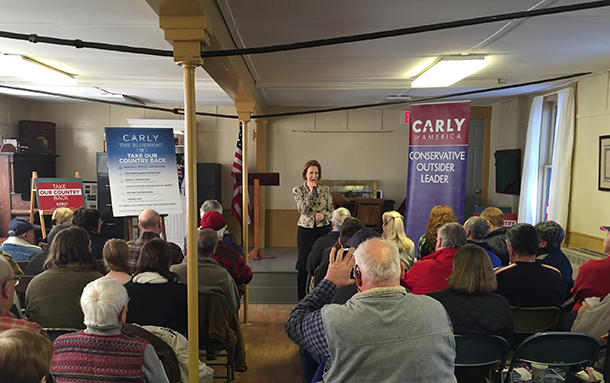
While former tech executive Carly Fiorina acknowledges that climate change is real, she says it’s not a pressing issue. (Photo: Steve Curwood)
CURWOOD: Well, to get a broader perspective on how the GOP presidential candidates are handling climate disruption on the campaign trail, I’m back in the studio now to speak with Clare Foran, associate editor of the Atlantic. Clare talked to us as the presidential race was starting to heat up nearly a year ago. Clare, welcome back to Living on Earth!
FORAN: Thank you so much for having me!
CURWOOD: Now when we talked to you a year ago, the race was just heating up when you talked to us about the various Republican candidate positions on climate change. At the risk of a pun, what change do you see in that field?
FORAN: Well, I think that in the last year, a couple of themes have emerged. Last time I talked to you, it seemed like most candidates were willing to say that the climate was changing, but they just didn't want to necessarily say that human activity was to blame. In the year that's followed, you've seen some candidates who are trying to stake out a more moderate territory and perhaps test messages around climate change that might resonate in a general election. These would be candidates like Jeb Bush, who said in the last year that he's concerned about climate change, that it is something that should be thinking about, though he has still equivocated when asked exactly how much human activity is contributing. Carly Fiorina has also said, yes, climate change is something we need to think about, but both Bush and Fiorina, as well as some other prominent Republicans, have sort of suggested that this is something perhaps the free market will take care of. And then you've also seen Ted Cruz and Donald Trump take a different tack, and sort of adopt rhetoric that is inflammatory. Donald Trump, I believe, recently referred to climate change as a hoax. Ted Cruz also has warned against global warming, what he says is alarmism. So you've seen sort of different responses in the last year.
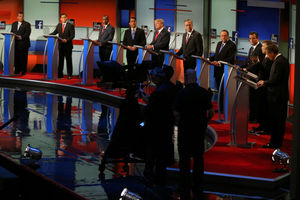
The Republican candidates on the debate stage December 15th. (Photo: Angelgfg12345, Wikimedia Commons CC BY-SA 4.0)
CURWOOD: What did you think of the response of Jeb Bush to the notion that hey, if were President, he'd have to respond to the Paris accord. He didn't seem to know so much about it, it felt to me.
FORAN: Yeah. Well, I think in the last couple of months, we saw sort of this historic Paris climate summit, one of the most significant international steps to dealing with climate change. And what was really interesting is that, a lot of the Republican presidential candidates didn't even really react even when that summit was going on and kind of in the aftermath of it, and I see Jeb Bush's response to being asked about that very much in the same vein. He's willing to sort of engage when pushed, and what he seems to be doing is essentially undermining what the President has attempted to achieve with the deal. Youknow, if you listen to what Bush was saying, he was trying to argue that the President really did not have the authority to go to Paris, and to strike this deal, but he does not say what he would do.
CURWOOD: Marco Rubio was fairly clear that when it comes to helping developing nations, he's not aboard.
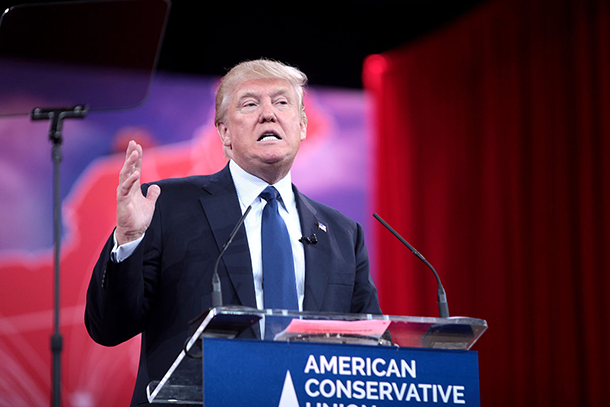
Donald Trump speaking at the 2015 Conservative Political Action Conference (CPAC). (Photo: Gage Skidmore, Wikimedia Commons CC BY-SA 3.0)
FORAN: Yeah, so Marco Rubio similarly offering a line of argument that many other Republican presidential contenders that have echoed, arguing that there's a lot of other countries out there belching smog and pollution and what can we really do, and perhaps the US should not be leading on this issue, which I think has the same functional effect of Jeb Bush questioning the legality of the Paris agreement. It just suggests that the US should not be taking the leading role in trying to corral the other nations into making carbon reductions.
CURWOOD: What did you make of the sort of wink and nod that John Kasich had about how his contenders, his opponents in the primary races view climate. What do you think he was trying to signal with that?
FORAN: Kasich's been interesting to watch on climate change in the last few months because, so on the one hand, you have Kasich who is trying to position himself as a more moderate Republican, somebody who's kind of a voice of reason in a Republican party that's kind of seen Donald Trump steal the spotlight away. But on the issue of climate change, in some ways, he's offered seemingly contradictory positions. And you saw that even in that exchange he sort of said well, I support clean energy and I don't think we should worship the environment, I think we need to have a balance. But he's not necessarily clearly laying out what he thinks should be a plan of action. And Kasich has been interesting to observe in the Republican primary debates. There was a December Republican debate right around the time of the Paris climate summit, and Kasich proactively brought up climate change and essentially said, the administration is out there in Paris dealing with climate change, well that's not the right priority. We should be talking about ISIS and the threat of terrorism. He wasn't even asked about climate change, and a lot of national security experts would argue that that's not the way to be thinking about the issue because climate change can exacerbate national security threats.
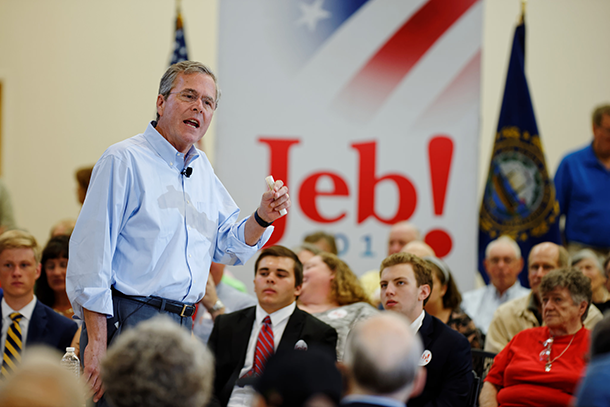
Governor of Florida Jeb Bush at TurboCam, Barrington, NH on August 7th, 2015. (Photo: Michael Vadon, Flickr CC BY-SA 2.0)
CURWOOD: What about Governor Christie and Senator Paul? To what extent have they moved since we talked a year ago?
FORAN: Well, I think that Rand Paul has sort of talked in the past about the need to sort of make sure that the environment is protected and he spoke about that in very general terms, and Christie has acknowledged the threat of climate change, but we certainly have not seen them proactively bringing this topic up, you have not seen them outlining any proposals, and I think it really just gets back to the fact that this is just a subject that candidates are seeking to avoid, taking a stance that climate change is real and that we need to do something about it. It doesn't play as well with the most conservative of Republicans as it does moderates and independents. I think it's been interesting to see how you really haven't seen moderators of most Republican debates asking about climate change either. These candidates are not being pressed.
CURWOOD: Now, Clare, we've seen polls saying that in a general election, a substantial majority of voters wouldn't support somebody who doesn't want to take action on climate change. So, how does that polling affect what these GOP folks are doing at this point in the campaign?
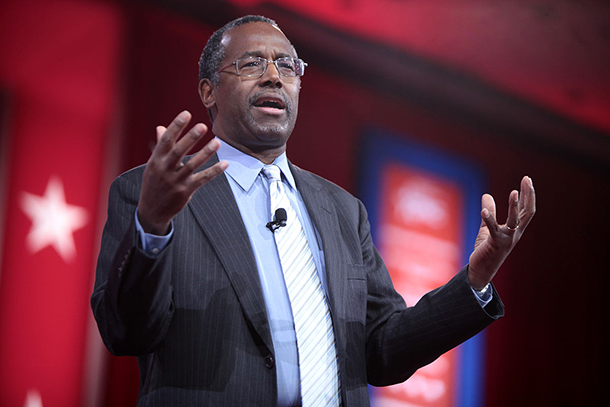
Ben Carson speaking at the 2015 Conservative Political Action Conference (CPAC) in National Harbor, Maryland, on February 26, 2015. (Photo: Gage Skidmore, Wikimedia Commons CC BY-SA 3.0)
FORAN: I think that that's where you get to Jeb Bush, I think Fiorina and also to some extent Marco Rubio talking about this idea that perhaps the private sector, the free market, innovation, may be a way to solve climate change. I think it's possible that candidates will start to advance that line of argument more as we get into the general, but perhaps leave themselves wiggle room and not necessarily come up with a plan for sort of how the government under a Republican president should respond to climate change, but to rather suggest that this is something that the free market should deal with. But what it's glossing over is just that sort of a massive amount of research and development needs to be sort of invested in order for us to have breakthroughs that would allow clean energy to compete better than it is currently against fossil fuels, and historically, those have been investments made by the government.
CURWOOD: So, if you look at the Las Vegas odds-makers, they say that it's Donald Trump or Marco Rubio who’s ultimately the Republican nominee and those same odds-makers say that Hillary Clinton will be on the other side of the ticket. If that is indeed how the race plays out, to what extent do you think climate could influence the much desired swing voters.
FORAN: So, there's certain issues, things like abortion, and in some cases for some voters, gun rights that people will vote for or against a candidate based solely on that one position. Climate change, I don't think falls into that category. I mean, there's a lot of people who would say that climate change is important, but are not going to be voting based solely on a candidate's position on climate change. But I do think that climate change has the potential to become sort of this marker that broadly characterizes a candidate. So, for example, if you have somebody like Donald Trump who says that climate change is a hoax, that sort of asks as a signal to voters that this is somebody who is rejecting mainstream climate science, and it may be something that voters can kind of look at the stand or position of a candidate on climate change and that may be something that informs their broader opinion, for or against.

Clare Foran is an Associate Editor with The Atlantic, where she covers climate change, immigration, the 2016 presidential election, and all things politics. (Photo: Naomi Arenberg)
CURWOOD: Clare, to what extent does the GOP risk becoming irrelevant as a party with its failure to address climate disruption?
FORAN: Well, I think that this is something that will have to be addressed by Republican candidates in the general election, but I don't think there is any reason to believe there’s going to be a steep penalty for attempting to evade it in the primary. So, I think the question becomes, how much and in what ways does the Republican candidate address this in the general and are we going to see some type of a Republican or conservative sort of proposal to deal with climate change or are we just going to see candidates essentially paying lip service to the idea that there is a problem, but leaving themselves enough wiggle room to evade actually putting out a platform that would deal with it.
CURWOOD: Clare Foran is an Associate Editor at the Atlantic where she covers the 2016 election, climate change, and for that matter, all things politics. Thanks again, Clare.
FORAN: Thank you so much.
Related links:
- Clare Foran’s political coverage at The Atlantic
- Listen to our previous discussion with Clare Foran
- Where the Candidates Stand on Climate Change
- Washington Post:Republicans might actually be willing to do something about climate change
- MSNBC: Republican candidates score abysmally on climate change: AP
[MUSIC: David Grisman, Dawganova, Acoustic Disc 1991]
CURWOOD: Coming up...California’s path towards government action on climate protection. That's just ahead on Living on Earth. Stay tuned.
ANNOUNCER: Funding for Living on Earth comes from United Technologies, a provider to the aerospace and building systems industries worldwide. UTC Building & Industrial Systems, provide building technologies and supplies container refrigeration systems that transport and preserve food and medicine with brands such as Otis, Carrier, Chubb, Edwards and Kidde. This is PRI, Public Radio International.
[CUTAWAY MUSIC: David Bowie, without You, Let’s Dance, 1983, EMI]
Financing the Renewable Revolution

Tom Steyer is co-founder of Next Generation. His group that promotes solutions to two of the biggest challenges confronting the next generation of Americans: The risk of dangerous climate change, and the threat of diminished prospects for children and families. (Photo: Fortune Live Media, Flickr CC BY-NC-ND 2.0)
CURWOOD: It's Living on Earth, I'm Steve Curwood. One thing that wasn't in the State of the Union address was any talk of putting a price on carbon. But even if a federal carbon tax feels a long way off, states including California have begun to move ahead with cap and trade efforts that do put a price on global warming pollution. While we were in Paris at the historic climate summit, we caught up with investor and philanthropist Tom Steyer, who’s pledged a sizeable amount of his considerable fortune to environmental causes. And he says carbon-pricing efforts like California's are exactly what we need around the world to address the grave threats of climate disruption.
STEYER: When we think about carbon trading and the cap and trade system in California, we can say first of all, that it's happening, that it's going to raise up to $2.5 billion dollars this year for the state and, at the same time, we've been leading the country in terms of moving to a clean energy economy at the same time that we've been growing faster than the rest of the United States. So when we think about that policy and how it has impacted us, we can see that actually moving to a clean energy economy is part of the reason that California's been growing faster and producing jobs faster.
CURWOOD: Do you have some numbers? I mean, how much has reducing carbon helped California's economy?
STEYER: One of the ways that we think that energy really impacts us is in terms of jobs. I think there has been a false argument against moving to a clean energy economy which is that if you do so it will be a job killer. Actually, what we're seeing is that A: by the end of this year, we expect that they will be up to 500,000 Californians employed in clean energy jobs and in addition, we've just done a study in the last five months that shows that nationwide, if we accelerate the move to a clean energy economy, it will produce a net additional million jobs by 2030. So in fact the argument that moving to clean energy is a job killer is false. Not only does it create net new jobs it also reduces energy costs across society and makes people's take home pay be higher. So actually what we're seeing in California is something we expect to happen across the United States as it adopts clean energy.
CURWOOD: Politically, President Obama came here, a lot of enthusiasm, making a number of pledges, wants to move the US forward. At the same time, we have the Republican congress, which as a whole is fairly tentative if not skeptical about dealing with climate disruption. How can the U.S. move forward at this time?

Solar has become some of the cheapest energy in California, and job growth from renewables in the state has overtaken that from fossil fuels. (Photo: Solar PV and system installation, Flickr CC BY-SA 2.0)
STEYER: Well, we are huge believers in democracy, and that means the people of the United States, not just the elected officials of the United States. And what we've seen over the last six months is an incredible move across the board for Americans regardless of political party to accept the idea that clean energy is the future and that we should move faster towards it and the idea that doing so will prevent climate change. So that means we've seen a 12 percent move by Republicans in the last six months, which is unheard of. So really what we think what has to happen is we think Americans, citizens, voters, have to decide both that they agree with us that advanced energy is the future which they do and that it is important, and when they tell people that are running for office that they insist that this happens, it will happen because people running for office pay a lot of attention to the voters. So we really think this is just a traditional exercise in democracy. The people have to be listened to, and the people have to speak.
CURWOOD: Looking outside the United States, what needs to be done to help places like India, for example, which, yes, it may be the number three or number four world emitter with a billion people, but their per capita emissions make them, what, like 134? How can India move forward in these times when carbon needs to be reduced, but that's all they have right now?
STEYER: The way that people around the world generate and use energy is going to be driven by cost and technology. So what we're really seeing in California as I said is the price of renewable energy dropping precipitously. And it will continue to drop if you're used to technology driven cost curves. It's not like it's going to stop today. People don't understand that it's going to continue to drop. So, actually, what's going to happen for India is that this is going to be, by far, the best choice that they can make. They're going to look at it and I think it's going to be overwhelming obvious if it isn't already that actually moving to solar, moving to wind is going to be much cheaper than anything else they can do. So, actually, they're not being asked to sacrifice, they're going to be making economic decisions in their own interests but which also that are going to be something to be avoid greenhouse gas emissions.
CURWOOD: How can they afford this? I mean, capital costs in India - 10, 12, 13, percent to borrow money. A company here in the US, if it wants to go solar or wind can borrow that money for half, a third of that expense, and there are plenty of people willing to lend it to them. In other words, how do you get financing going at an international level at the scale that's need to change things?
STEYER: Actually, I think that's a great question because when you think about the cost to India, this is by far, the cheapest way of generating energy. And the question is, the capital costs. And so, I think, as we move forward, that is where the coordination of nations and public and private entities are going to have to push to reward them for making what are smart decisions because I know that the capital costs in India are relatively very high to what they are in the United States, but that would also be true for coal plants. But the fact of the matter is, we need to help them adopt energy in general because if they do, they'll be adopting clean energy.

Indian coal miners. Steyer argues that with the help of international financial incentives, India can make the transition to renewables, which would significantly cut their emissions and improve public health. (Photo: Biswarup Ganguly, Wikimedia Commons CC BY 3.0)
CURWOOD: But they can borrow money for coal much cheaper than they can for solar because coal is proven there, there are coal reserves, whereas they say, the sun can only be used six to eight hours a day and there is less willingness to lend for solar, for example, over there.
STEYER: Well, that is something where I think the international financial community needs to start checking exactly what their function is, what they are thinking because, the fact of the matter is, if you look at the United States of America, a number of banks have withdrawn lending to coal. So why they would think that would be different in different parts of the world, I'm not sure, but I think if you look forward out into the life of a plant, which is at least 30 years, the idea that that could be a good investment that's going to be a safe investment, seems to me to be kind of silly.
CURWOOD: What moves are you making around the world? Are you in India? Are you in Kenya? Are you in Chile? Where are you taking your expertise to bridge the knowledge gap as to how you finance advanced technology?
STEYER: Well, there are a couple of points I make. One is, I haven’t been making my own investments for three years. Secondly, anything we do in the renewable space we've said we will give away the profits so people don't think that I'm advocating for something so I can make a buck for myself.
CURWOOD: But you know how to do this, so you don't necessarily have to go and make money, but you know how to introduce people, you know how things are done.
STEYER: And that is what we are trying to do, we are trying to point out to people, a different way of looking forward. I think to a very large extent, the financial world is controlled by their own computer programs. We think the accounting in those programs is faulty because it doesn't include certainly the health costs of fossil fuel plants, but we also think the projections of costs and expectations are also faulty, so that's why we're pushing really hard for people to starting thinking differently about projected costs and technologically driven energy, why we want them to include the costs of health and GHGs in fossil fuel energy, and why we're saying to people, look, the actual work that's been done shows these will create jobs net, net, net.
CURWOOD: Tom Steyer is the founder of NextGen. Thank you so much.
STEYER: Steve, thank you so much for having me.
Related links:
- California Clean Energy Jobs Act (Proposition 39)
- 1 million jobs could be created by cutting carbon emissions, Tom Steyer says
- The Guardian: Billionaire activist urges Obama to focus State of the Union on climate change
- California's Tom Steyer has rare access and a big megaphone on climate change
- California’s Cap and trade: Emissions reductions at low cost
- California Public Utilities Commission: Energy
- Grist: Millennials really want to transition to clean energy, says new poll
- About Tom Steyer and NextGen Climate
[MUSIC: Sufjan Stevens, Death with Dignity, Carrie and Lowell, Asthmatic Kitty 2015]
Saving a Bear Cub
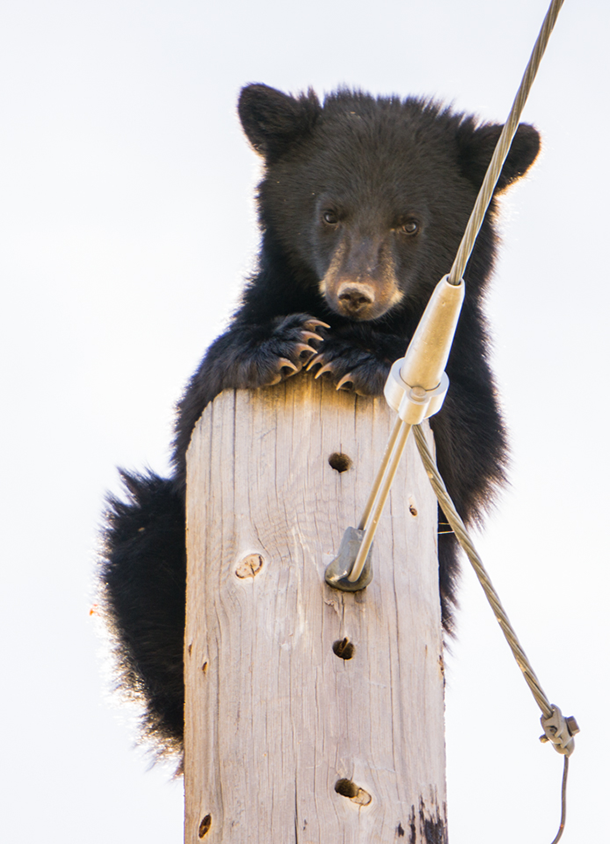
The black bear cub perched atop a telephone pole, just seconds before he lost consciousness from the tranquilizer and fell. (Photo: Sarah Hewitt)
CURWOOD: One topic in the news at the moment involves the question of how to share the resources of the American west. Wildlife there is often protected by authorities, but it’s not always appreciated by locals when there are shortfalls. Reporter Clay Scott of Mountain West Voices brings us a tale of how game wardens in Montana cared for a lonely black bear cub.
SCOTT: The hot dry summer meant not a lot of berries, and that in turn meant that many bears had to forage far from their normal territory. Quite a few of those wandering bears ended up being shot, or hit by cars. And that means there were a lot of orphaned black bear cubs this year. Like the one a friend and I saw when we were driving down a dirt road on the prairie, miles from suitable black bear habitat. At first, as it scurried through the grass, it looked like a black lab puppy. Then it scampered up a power pole.
MURPHY: We’ve been really, really busy with bears, all throughout the state this year. We’ve handled a lot of different urban wildlife bear complaints.
SCOTT: That’s Brady Murphy. He’s a game warden in Augusta, Montana. When he arrived, less than a half hour after I called him, the cub was still looking down at us from the top of the 40-foot power pole.
MURPHY: We’re just gonna be able to kind of hopefully get some Telazol in him, tranquilizers, and get him relocated. See what we can do with him.
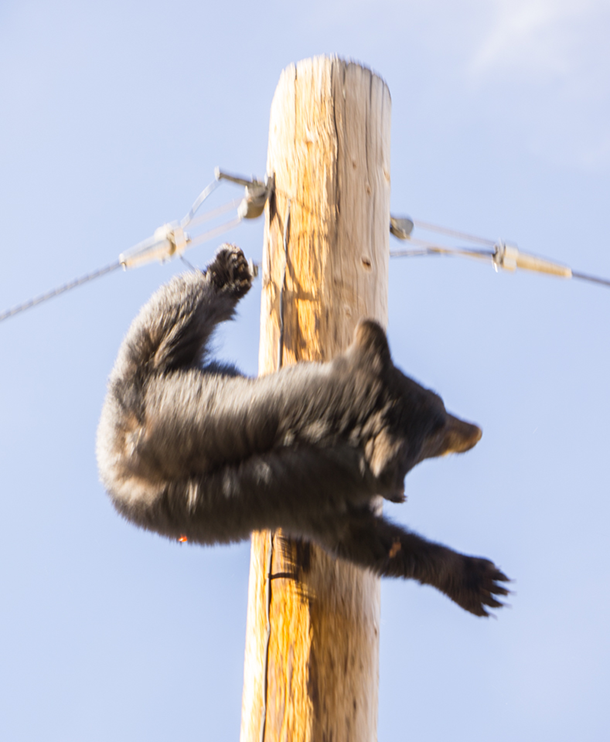
The cub was unconscious within 45 seconds of being hit with a tranquilizer dart. (Photo: Sarah Hewitt)
SCOTT: Brady doesn’t have any tranquilizer darts, so he puts out a call for help. Two wardens respond from other districts.
MURPHY ON RADIO: Bob Thomas Road. Are you coming up 287? So you’ll come up…it’s…
SCOTT: Game wardens in Montana cover vast territories. Teigan Winters is driving 50 miles to get to where we are. Kqyn Kuka is on her way from north of Great Falls – that’s an hour and a half drive. I ask Murphy why, in the middle of hunting season, three wardens would converge on a power pole in the middle of the prairie to tranquilize a black bear cub.
MURPHY: You don’t do this job to get rich. You do it because you love the resources and you wanna protect them. And you have that strong passion.
SCOTT: Finally, the other wardens are here. Kuka has brought a dart pistol. Winters has tranquilizers. The trouble is, even if they manage to hit the bear cub with a dart, it wouldn’t survive the fall. They need to get him to come down. Murphy grabs a shotgun.
SCOTT: So explain what you’re doing here.
MURPHY: We just have a simple cracker shell…coming out of a shotgun…it’s essentially a big firecracker. We’re gonna try and shoot it way up above him…hopefully that bang will encourage him to move a little bit and come down or something…so we’re gonna give it a try. Ready?
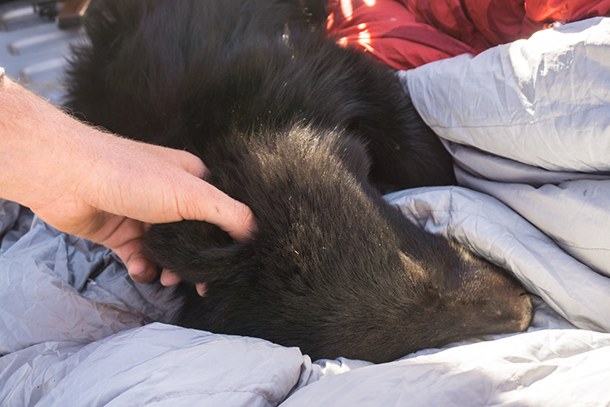
The game wardens safely caught the cub in a sleeping bag as he fell. He was unharmed. (Photo: Sarah Hewitt)
[SOUND OF EXPLOSION]
SCOTT: At the explosion, the cub doesn’t even flinch. We back up several hundred yards. The plan is to lure the cub down, then chase him up a smaller pole and dart him. Kuka has offered her sleeping bag as kind of net to catch the cub as he falls. She’s at the wheel of her pickup, and the rest of us are in the back. Murphy has the dart pistol at the ready. We watch the bear through the binoculars. At this distance, he’s a black dot against the prairie sky. Finally, the cub straddles the pole, and starts to move down.
MURPHY: I think he’s about down...or close...I want him all the way down before we go up there.
WINTERS: I’d rather have him out on the ground and we’ll get him out in the field.
MURPHY: I think he’s down. Does it look like he’s down? [CAR DOOR]
WINTERS: Good luck.
[DRIVING]
[WIND]
MURPHY: Crossing the road!
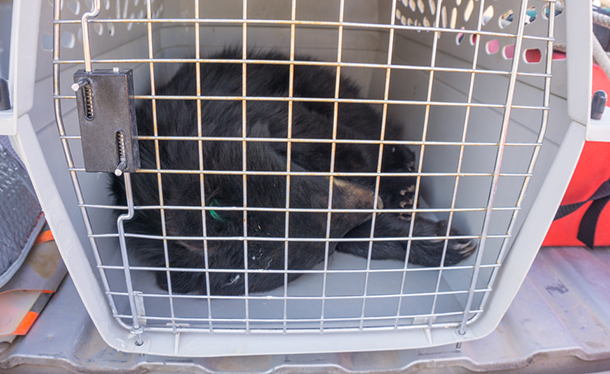
The cub was transported to a wildlife rehab center. (Photo: Sarah Hewitt)
SCOTT: The cub scurries across the road and up the smaller pole.
KUKA: We can catch him from there.
WINTERS: Get your sleeping bag.
SCOTT: The wardens gather round with the tranquillizer dart.
ALL: Ready?
KUKA: Yup.
[DART NOISE]
WINTERS: Good dart.
KUKA: Good shot, Brady!
WINTERS: Good dart, though. Good hit.
KUKA: Good hit. He’s going to fall back. He’s going to hit the pole. Here he comes. Uh oh.
MURPHY: Just wait, hold on.
SCOTT: The bear wobbles and falls.
WINTERS: He’s coming head first.
KUKA: Here he comes!
SCOTT: They rush to catch it.
KUKA: Oh, yes, you got him! Go go go. Unbelievable! We did it!
SCOTT: They lay the cub carefully in the back of the pick-up. It turned out to be a male, less than 25 pounds. He’ll spend the winter at Montana Wild, the wildlife rehab center in Helena, and will be released next spring.
For Living on Earth, I’m Clay Scott in Augusta, Montana.
Related links:
- Black bears 'pour down' on western Montana valleys for apples, berries
- Montana Wild
- Mountain West Voices
- More about Montana’s game wardens
Polar Bear Summits Talus Mound

Murre nest high up on rocky cliffs in the lower arctic region. Polar bears often climb in search of them for food. (Photo: Mark Seth Lender)
CURWOOD: And we stay with bears for this next story. This time, it’s a different bear, of a color as different as night and day. We’re up in the north of Canada, in Hudson Strait on the island of Akpatok, noted for its polar bears, as well as its precipitous 700 foot high limestone cliffs where the thick-billed murre nest. They’re a species of auk with stubby penguin-like wings whose nests lure the great white bears who also live there. But as writer Mark Seth Lender observed, sometimes the bears seem to contemplate other potential sources of nourishment.
Bear on the Talus Mound © 2015 Mark Seth Lender All Rights Reserved
LENDER: He is big and white and perfect. That kind of polar bear a certain kind of hunter wants to see, mounted on a wall. All things being equal, you can be certain, Bear’s the one bringing all the trophies home.
Two weeks and the fledgling thick-billed murre will begin to fall from their hard rock nests on Akpatok, in the sheer limestone wall. Unable to fly, they will tumble five, six, seven hundred feet straight down, aiming for water. Lucky for the ones who make it. The others? Manna in Feathers (that’s what Bear is waiting for).
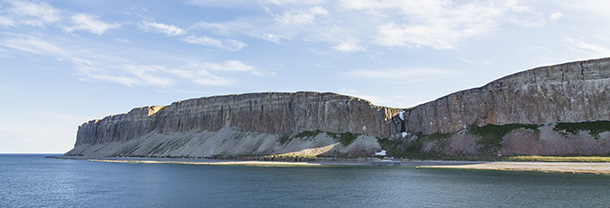
Hudson Strait and Akpatok Island is one of the uninhabited Canadian Arctic islands in the Qikiqtaaluk Region of Nunavut, Canada. (Photo: Mark Seth Lender)
And Bear no doubt is tired of waiting.
Up he goes walking the loose detritus of the talus mound, the slope steep as an avalanche though to Bear with his wide gripping feet the incline might as well be level ground. A hundred yards high, Bear sits down.
He looks about as if he’s enjoying the view. Though there is no view. Only the blank face of an ocean just as well admired from below. And with nothing to eat there is nothing for Bear to do. No reason for the climb, the calories burned, this particular place. No apparent cause for Bear’s demeanor, and that lolling lazy look on his face.
The Plane curls around the corner in close, wing high not more than thirty meters between the vertical of the cliff and the fuselage. Looking for polar bear but entering the space from the wrong side: They had no way of knowing Bear, was there.
Yet there he is. Right altitude right attitude to look, straight, into the little windows like seal holes in the ice, and the funny chewy little faces pressed against the Plexiglass. Nice. Very nice.

The murre are not there, but bear climbs anyway. (Photo: Mark Seth Lender)
And the Rolls Royce engines hit the red line with a growl that even a polar bear cannot match and the airplane levels out again and vanishes at a couple of three hundred knots.
Bear does not run, though I’ve seen bigger ones than him take off like a shot with far less provocation. Instead, Bear lies down, his chin resting on those huge white paws like some guy stretched out on the couch.
Late in the afternoon the same plane makes another pass. Same approach. Same altitude. Same distance off the cliff.
Bear is not there.
There are no polar bears at all.
And I wonder, as they disappear into the clouds, all those paying customers and all the money they just spent, really: Who’s the entertainment?
CURWOOD: Writer Mark Seth Lender – and there are photos of both these close encounters of the ursine kind at our website LOE.org.
Related links:
- More about the common murre
- Akpatok Island is one of the uninhabited Canadian Arctic islands
- Mark reached Akpatok onboard ship with Adventure Canada
- Parks Canada
[MUSIC: The Mamas and the Papas, Dancing Bear, All the Leaves Are Brown, 2001]
CURWOOD: Next time on Living on Earth, after punishing drought out west, the el Niño weather pattern has brought some welcome rains, but significant flooding along the Mississippi River.
TRENBERTH: Certainly in Missouri for this time of year it's totally unprecedented. It's three times the normal amount. So climate change is playing a role as well as these El Niños.
CURWOOD: How global warming helps reinforce El Niño. That’s next time, on Living on Earth.
[MUSIC: David Bowie, Eight Line Poem, Hunky Dory, Rykodisc 2015]
CURWOOD: Living on Earth is produced by the World Media Foundation and brought to you with support from the University of Massachusetts Boston, in association with its School for the Environment, developing the next generation of environmental leaders. Our crew includes Naomi Arenberg, Bobby Bascomb, Emmett Fitzgerald, Lauren Hinkel, Helen Palmer, Adelaide Chen, Jenni Doering, John Duff, Amber Rodriguez, and Jennifer Marquis, and we welcome a new intern today – Jaime Kaiser – welcome aboard! Thanks also today to Adventure Canada. Tom Tiger engineered our show, with help from Jeff Wade, Jake Rego and Noel Flatt. Alison Lirish Dean composed our themes. You can find us anytime at LOE.org - and like us on our Facebook page - it’s PRI’s Living on Earth. And we tweet from @LivingOnEarth. I'm Steve Curwood. Thanks for listening.
ANNOUNCER1: Funding for Living On Earth comes from the Grantham Foundation for the protection of the environment, supporting strategic communications and collaboration in solving the world’s most pressing environmental problems. Support also comes from Trinity University Press, publisher of Moral Ground; Ethical Action for a Planet in Peril, 80 visionaries who agree with Pope Francis, climate change is a moral issue for each of us. TU Press.org, and Gilman Ordway for coverage of conservation and environmental change. Living on Earth is also supported by Stonyfield Farm, makers of organic yogurt, smoothies and more. www.stonyfield.com.
ANNOUNCER2: PRI. Public Radio International
Living on Earth wants to hear from you!
Living on Earth
62 Calef Highway, Suite 212
Lee, NH 03861
Telephone: 617-287-4121
E-mail: comments@loe.org
Newsletter [Click here]
Donate to Living on Earth!
Living on Earth is an independent media program and relies entirely on contributions from listeners and institutions supporting public service. Please donate now to preserve an independent environmental voice.
NewsletterLiving on Earth offers a weekly delivery of the show's rundown to your mailbox. Sign up for our newsletter today!
 Sailors For The Sea: Be the change you want to sea.
Sailors For The Sea: Be the change you want to sea.
 The Grantham Foundation for the Protection of the Environment: Committed to protecting and improving the health of the global environment.
The Grantham Foundation for the Protection of the Environment: Committed to protecting and improving the health of the global environment.
 Contribute to Living on Earth and receive, as our gift to you, an archival print of one of Mark Seth Lender's extraordinary wildlife photographs. Follow the link to see Mark's current collection of photographs.
Contribute to Living on Earth and receive, as our gift to you, an archival print of one of Mark Seth Lender's extraordinary wildlife photographs. Follow the link to see Mark's current collection of photographs.
 Buy a signed copy of Mark Seth Lender's book Smeagull the Seagull & support Living on Earth
Buy a signed copy of Mark Seth Lender's book Smeagull the Seagull & support Living on Earth

